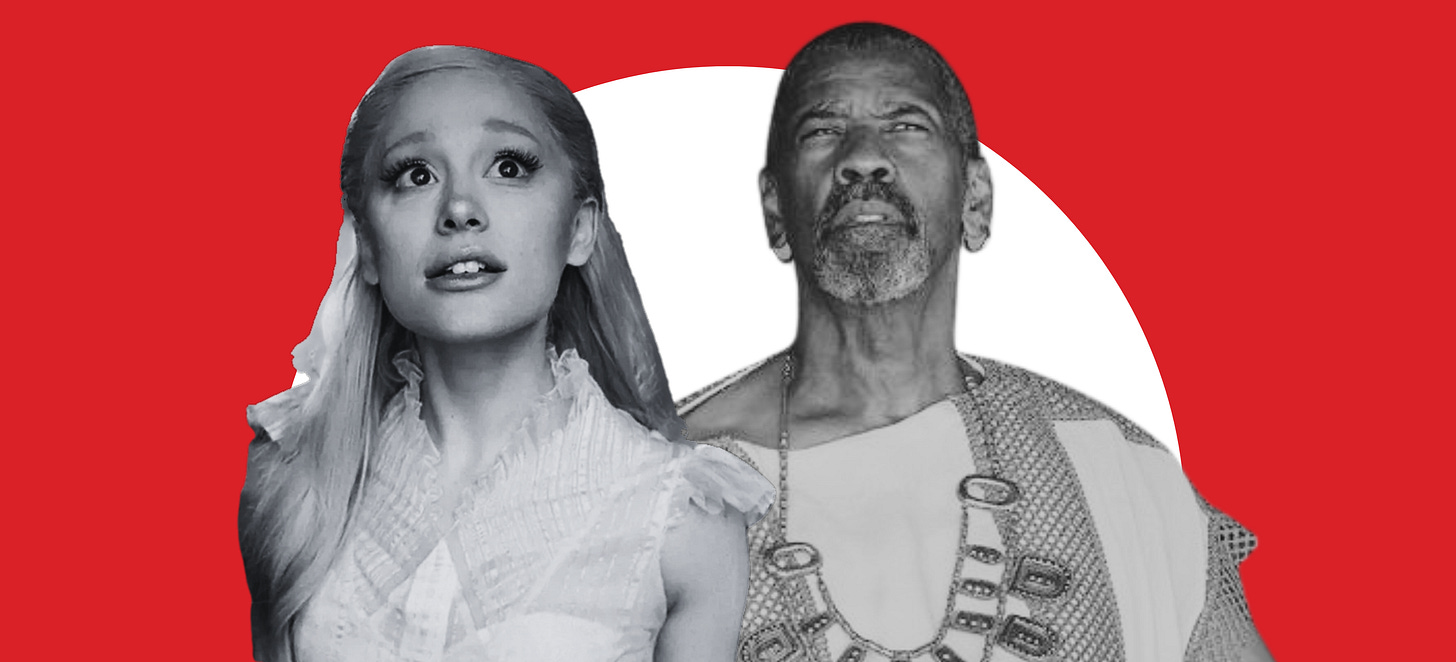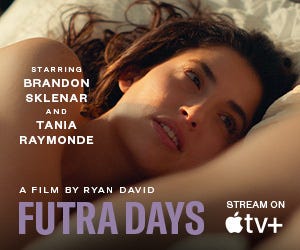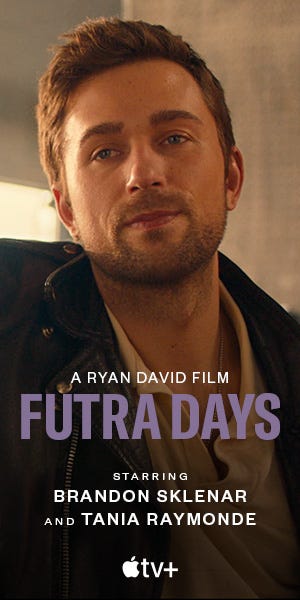Ariana Grande & Denzel Washington’s Kenergy
How buzzworthy turns in ‘Wicked’ and ‘Gladiator II’ could become supporting Oscar noms. Plus: Original song and doc short contenders

This week I’ve got a conversation with the mastermind behind several of the best movie soundtracks of the year, as well as a deep dive into one of the last bastions for short filmmaking on the internet. But first . . .
How’s this for a claim that sounds bonkers but is 100 percent true: Ariana Grande and Denzel Washington are the Ryan Gosling of 2024.
This weekend’s Gladiator II and Wicked spectacular wasn’t quite the Barbenheimer repeat might have prayed for, but close enough that the comparisons have been everywhere — I’m not going to call them Glicked, but you’re certainly welcome to.
The comparison I haven’t seen as much of, though, is how both Wicked and Gladiator II boast supporting performances that set the tone of everything around them, whether with bubbly cheer or Machiavellian scheming. Grande’s Glinda, a pink princess whose assumptions about the world are challenged by Cynthia Erivo’s Elphaba, carries a theater kid precision and sense of drama in every scene, paired with a soulfulness that emerges slowly throughout the film.
Washington, meanwhile, fully takes the reins of Gladiator II’s second half, playing a scheming villain who sadistically enjoys his violent rise to power. In vastly different ways, Washington and Grande remind the audience of what ought to be an obvious truth in these big-budget spectacles: This is supposed to be fun.
That was part of what propelled Gosling to his third Oscar nomination for Barbie as well — and might even be the reason his leading lady Margot Robbie was denied a best actress Oscar nomination of her own. Barbie was the heart and soul of Barbie, of course, but Ken was the one everybody walked out talking about.
Will that history repeat itself for Erivo and Paul Mescal, the actual leads of these films? Erivo has the benefit of the film’s big, iconic final song, of course, while Mescal is filling the type of role that won Russell Crowe an Oscar in 2000. But Crowe’s well-deserved victory was an incredibly rare moment when the Oscars actually recognized a blockbuster lead performance; more often, from Sylvester Stallone in Rocky to Julia Roberts in Pretty Woman, the incredibly rare gifts of movie stars get overlooked.
Their twin successes mean that Gladiator II and Wicked are likely both sticking around the Oscar race, both on their merits and as a necessary balance for a best picture slate that, other than Dune Part II, is dominated by films highly unlikely to crack even $50 million at the box office. Can Grande and Washington both hang in there as well? I’ll be rooting for them, at least.
Make Your Own Kind of Music
Here’s one category where Wicked absolutely won’t be able to follow Barbie’s footsteps: Best original song.
There are new songs to come in the second Wicked installment, due next year, but this first round exclusively contains songs from the Broadway musical and therefore is not eligible for Oscar’s best original song category. “At one point it was like, well, we could have an end title song,” says Mike Knobloch, president of NBCUniversal Music and Publishing, who oversaw the Wicked soundtrack. “But I think that only would’ve come across as like, Oh, of course they made a new song to have a new song for the movie. So it wasn’t done.”
That ability to anticipate the response to a soundtrack and build it into its own event has kept Knobloch remarkably busy this year, preparing the album for Wicked in addition to two other Universal blockbusters, Twisters and The Wild Robot. Both have albums that were carefully calibrated to their film’s needs, with Twisters boasting a murderer’s row of country stars and The Wild Robot powered by the sweeping score from Kris Bowers and the song “Kiss the Sky” performed by Maren Morris. It all came down, again, to Knobloch knowing exactly what each film called for.
“If we started just throwing stuff up against the screen or doing things for the wrong reasons, it wouldn’t work for people,” says Knobloch, who joined Universal in 2010 after a 14-year career at Fox. “It would reek of inauthenticity and people would see that from a mile away.”
Wicked may not be in the best original song race, but The Wild Robot and Twisters very much are, with the Twisters campaign focused on Lainey Wilson’s track “Out of Oklahoma.” Oscar shortlists for the song category and several others will be announced Dec. 17, where we’ll see how Universal’s projects fare against the likes of Emilia Pérez, which boasts songs from perennial powerhouse Diane Warren who has racked up 15 Oscar nominations and won an honorary Oscar at the 2022 Governors Awards.
If Twisters and/or The Wild Robot are nominated, Knobloch will be there to make sure the live performances are a blockbuster, too. In recent years he’s helped oversee such performances as Pharrell Williams’ “Happy” in 2014 and Justin Timberlake opening the Oscars with his Trolls song “Can’t Stop the Feeling” three years later.
Knobloch says the secret to a great Oscars performance is the same as when you know not to add a song to Wicked. “It’s about how to be authentic,” he says. “In the context of the Oscars, it all rolls up to the film title. So if you’re on stage at any award show doing something with a song from a movie and trying to turn it into its own thing for awards purposes, that’s not going to read properly.”
The Long and Short Of It
When we talk about the ways that the election will be reflected in this year’s Oscar race, we almost never mean films that are actually about the election itself. That is, unless you look toward the documentaries — the breaker of every Oscar pool, but also one of the most telling when it comes to figuring out what kind of stories Oscar voters really want to see told.
Feature-length documentary winners, like this year’s Ukraine-set 20 Years in Mariupol or 2019’s American Factory, often capture the zeitgeist much more directly than the best picture winner itself. But it’s the documentary shorts — cheaper and faster to make, and therefore possible to come from just about anywhere — where you can really see the whole world laid out in front of you.
Documentary shorts make it to the Oscars in all kinds of complex ways, from premiering at qualifying film festivals to being part of the student Academy Awards. But when the Oscar shortlists are announced on Dec. 17, with the 15 films that will continue moving forward in the Oscar race, it’s almost certain there will be several shorts backed by The New Yorker on that list.
With 17 Oscar nominations since it launched its documentary series in 2007, The New Yorker has backed some of the most powerful documentary shorts of recent years — and, more importantly, put them online where a broader audience can find them. With The New York Times winding down its own successful documentary arm earlier this year, The New Yorker Documentary Series is a unique blend of journalism and a streaming platform — not that everyone necessarily realizes it.
“I still go to screenings where we’re showing a block of New Yorker films, and people raise their hand and ask, ‘Where do I watch these?” says Paul Moakley, who has been heading up the documentary series since 2022. “They don’t think of us as a streamer.”
Many of The New Yorker’s Oscar-eligible shorts are available for free on the New Yorker website as well as on YouTube, tackling many of the same hot-button topics as the magazine itself: the aftermath of the January 6 riots, trans medical care, police brutality and more.
One of the most moving shorts I watched, Public Defender, follows D.C.-based attorney Heather Shaner and her work defending two people charged with trespassing in the Capitol on Jan. 6, 2021. “You think you’ve heard the story of January 6th over and over again, but then you meet Heather,” Moakley says. “Despite defending criminals and people who’ve done heinous crimes, she still has a lot of hope for humanity. That idea is just so lacking in part of our politics right now, and it’s a film that I hope breaks through a bit.”
Moakley and I spoke before the election made it clear just how challenging the next four years might be, but many of the shorts he backed have only since become more powerful. Even if the Oscars find themselves in an escapist mood, The New Yorker’s shorts hold up a mirror to reality you can’t look away from.





